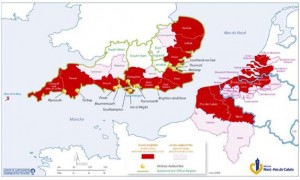Justification of the Project
The Fishery industry sector in the 2-Seas region is vulnerable because of increase in fuel cost, fish catch reduction, shrinkage of production space to be shared with shipping lanes and “marine protected areas” and offshore wind farms.
• The diesel fuel price has exceeded the barrier of 50 Euro cents per litter and will continue to increase. The price of fish is reducing. This impact of fuel costs on the turnover of a Fish Trawler is 40% and average annual turnover is less than 1 Million Euro. The ship owners can only compensate their increasing running costs by increasing fishing catch. The return on their capital investment and capacity for self financing are rapidly decreasing. To stabilize their debt ship owners are not renewing their production tools. Current trawlers are technically obsolete and their average age is over 20 years. They were designed to spend several weeks at sea whilst now they only spent five days. Diesel engines are too powerful for their current fishing purpose.
• The hybrid gas-electric propulsion system using natural gas has been developed in the commercial shipping and naval sectors. The price of this fuel is constantly reducing globally and is not connected to the oil price fluctuation. The introduction of natural gas in the fishing sector introduces immediate economical benefits and CO2 reductions at sea. The electric shore power on the port quayside suppresses these emissions. Fishing ports in 2-Seas do not provide technical or economically affordable alternatives instead of just diesel fuel (Natural gas, H2, biofuels, electricity).
• The fishing vessels still practice the classic catch methods from the eighties but then the impact of the fuel cost was four times less. The dependence of oil, climate change, excess fishing and biodiversity were not questioned then. This weakened industry sector is stalling to grab the change opportunities on the way to sustainable fishing.
